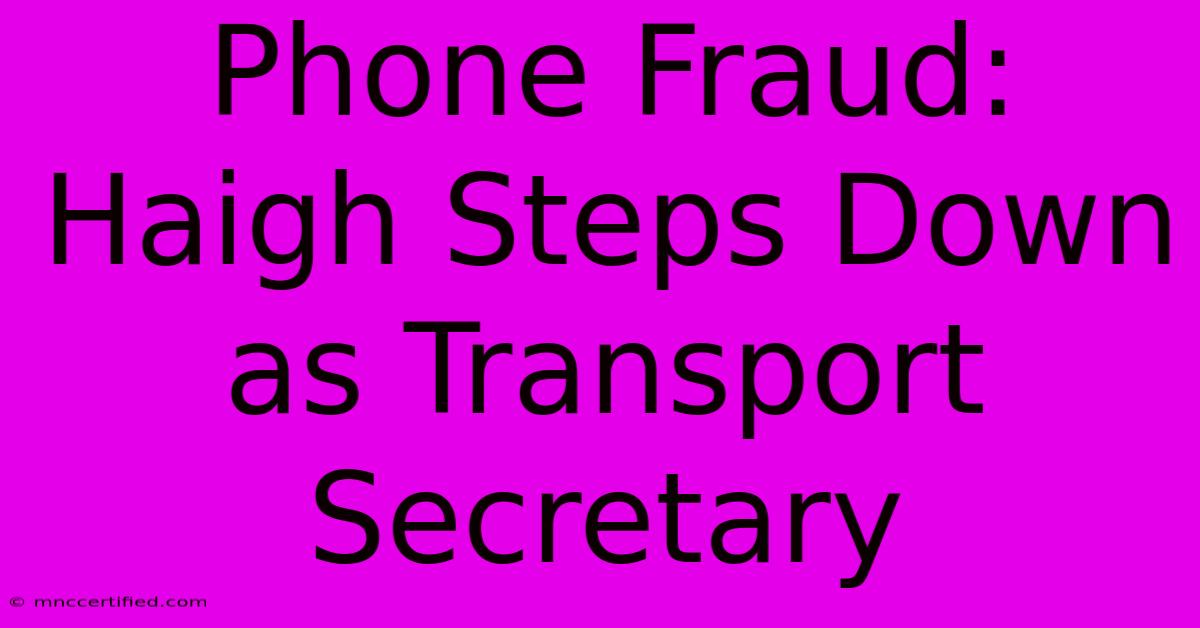Phone Fraud: Haigh Steps Down As Transport Secretary

Table of Contents
Phone Fraud: Haigh Steps Down as Transport Secretary
The sudden resignation of Transport Secretary, Anne Haigh, amidst a burgeoning phone fraud scandal has sent shockwaves through British politics. The scandal, which involves allegations of widespread misuse of taxpayer funds for personal phone calls, has raised serious questions about accountability and transparency within the government. This article delves into the details of the scandal, explores the potential ramifications, and examines the broader implications for public trust.
The Allegations: A Deep Dive into the Phone Fraud
The allegations against Haigh center around the misuse of her official government phone. Reports suggest that substantial personal calls, including international calls and premium-rate numbers, were made using the taxpayer-funded line. The scale of the alleged misuse is significant, potentially amounting to thousands of pounds in unauthorized expenses. While the full details remain under investigation, leaked documents and anonymous sources have fuelled intense media scrutiny. The investigation is being conducted by the Independent Office for Police Conduct (IOPC), and the findings are expected to be released in due course.
Key Questions Unanswered
Several crucial questions remain unanswered:
- The extent of the fraud: Precise figures regarding the cost of the alleged fraudulent calls are yet to be officially released. This uncertainty fuels speculation and public distrust.
- Complicity: Was Haigh acting alone, or was there any complicity from staff within the Department for Transport? This aspect of the investigation is critical in determining the full extent of the scandal.
- Accountability: What measures will be put in place to prevent similar incidents from occurring in the future? Strengthened regulations and enhanced oversight are vital to restore public confidence.
Haigh's Resignation: A Damage Control Measure?
Haigh's resignation, while seemingly a responsible act, is also viewed by some as a damage control measure aimed at minimizing further reputational damage to the government. Her statement, released shortly after the allegations surfaced, expressed regret but offered little in the way of concrete explanation or acceptance of wrongdoing. The timing of her resignation, coming just days before a planned parliamentary debate on the issue, suggests a calculated attempt to preempt a potentially damaging public grilling.
Political Fallout: Implications for the Government
This scandal has significant political ramifications. The opposition parties are likely to capitalize on the situation, demanding a full and transparent investigation. Public opinion polls are already showing a dip in approval ratings for the government, raising concerns about the potential impact on upcoming elections. The scandal also highlights the need for stricter regulations governing the use of public funds and greater accountability from government officials.
The Public's Perception: Erosion of Trust
Perhaps the most significant consequence of this phone fraud scandal is the erosion of public trust in government. Events like this reinforce a narrative of elitism and entitlement, fueling public cynicism and anger. Restoring that trust will require not only a thorough and transparent investigation but also a demonstrable commitment to reform and accountability. The government needs to show that it takes such allegations seriously and is taking decisive action to prevent similar occurrences.
Moving Forward: Lessons Learned and Necessary Reforms
The Haigh phone fraud scandal serves as a stark reminder of the importance of ethical conduct and financial transparency within government. Moving forward, several key reforms are needed:
- Enhanced monitoring systems: Implementing more robust monitoring systems to track and prevent the misuse of government phones and other resources.
- Strengthened accountability mechanisms: Establishing clear protocols and consequences for misuse of public funds, ensuring that individuals are held responsible for their actions.
- Increased transparency: Proactive dissemination of information and greater openness regarding government spending.
The resignation of Anne Haigh marks a significant moment in this unfolding scandal. While her departure may help to contain the immediate fallout, the underlying issues of accountability, transparency, and public trust require a much more substantial and long-term response from the government. The scandal highlights the need for continuous vigilance and a commitment to ethical governance in the public sector. The true test lies not just in the investigation's outcome but in the government's commitment to genuine reform and regaining public confidence.

Thank you for visiting our website wich cover about Phone Fraud: Haigh Steps Down As Transport Secretary. We hope the information provided has been useful to you. Feel free to contact us if you have any questions or need further assistance. See you next time and dont miss to bookmark.
Featured Posts
-
Uk Transport Secretary Haigh Resigns Over Phone Issue
Nov 29, 2024
-
Assisted Dying Kruger Donation Under Scrutiny
Nov 29, 2024
-
Letter For Claiming Insurance
Nov 29, 2024
-
Shaboozey At Bears Vs Lions Game
Nov 29, 2024
-
Walmarts Black Friday Yankee Candle Deals
Nov 29, 2024